
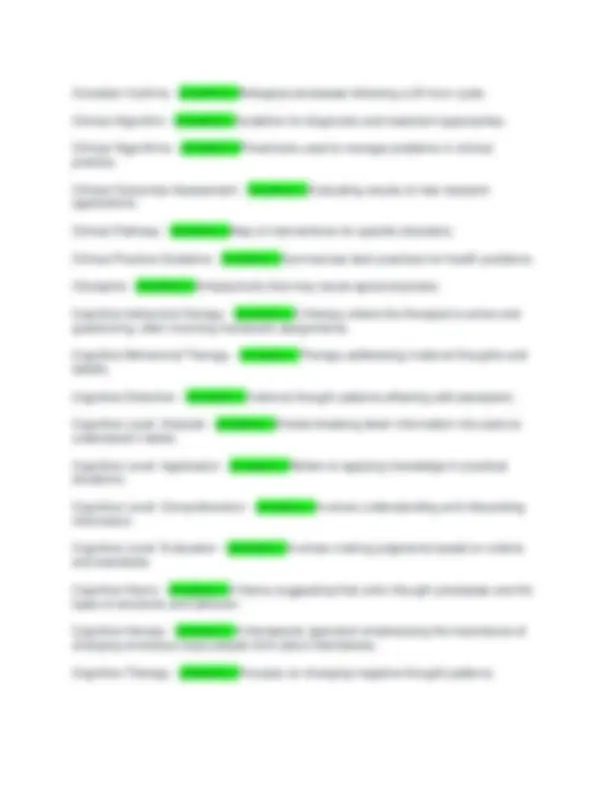
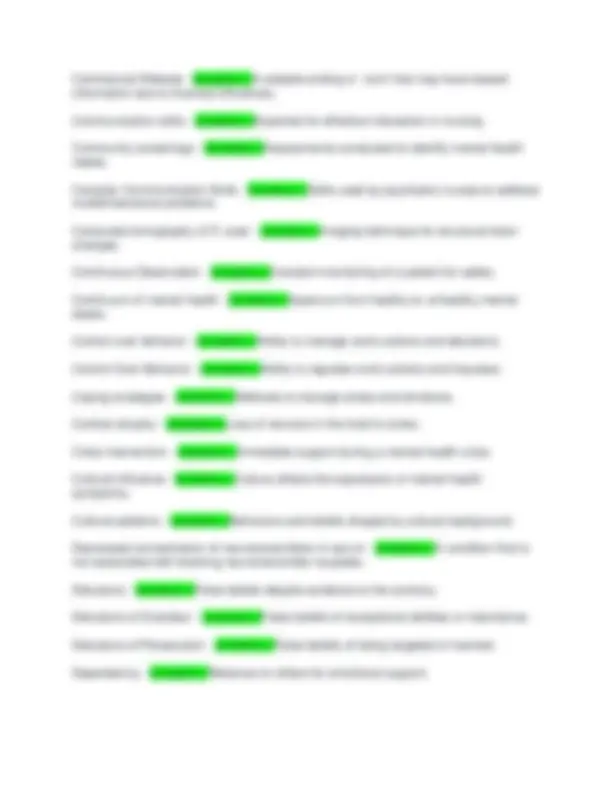
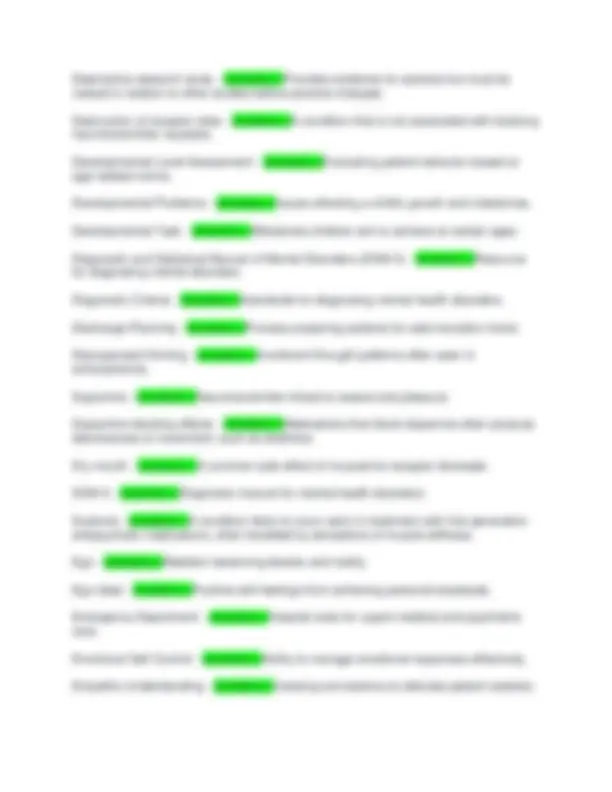
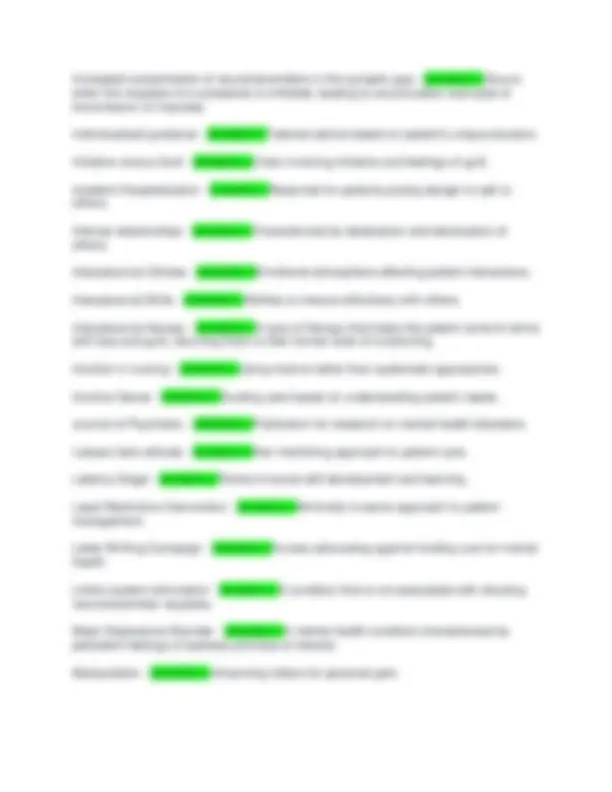
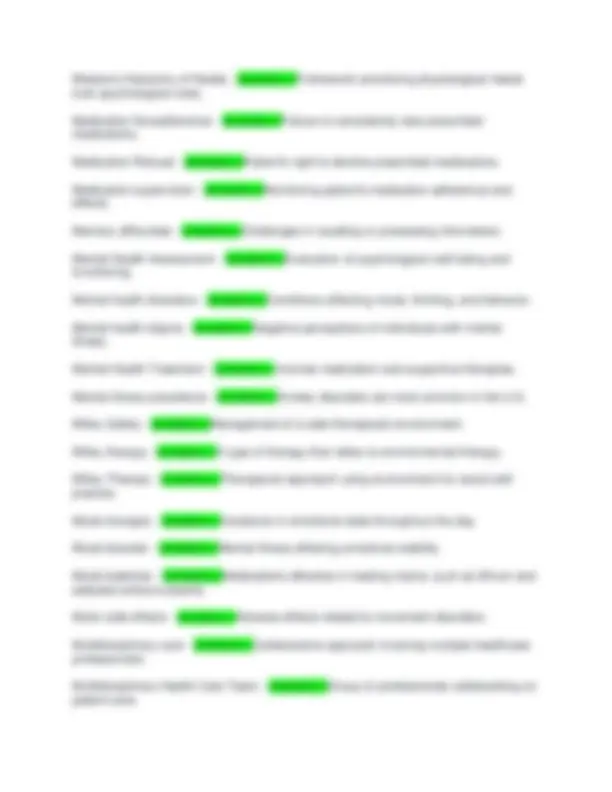
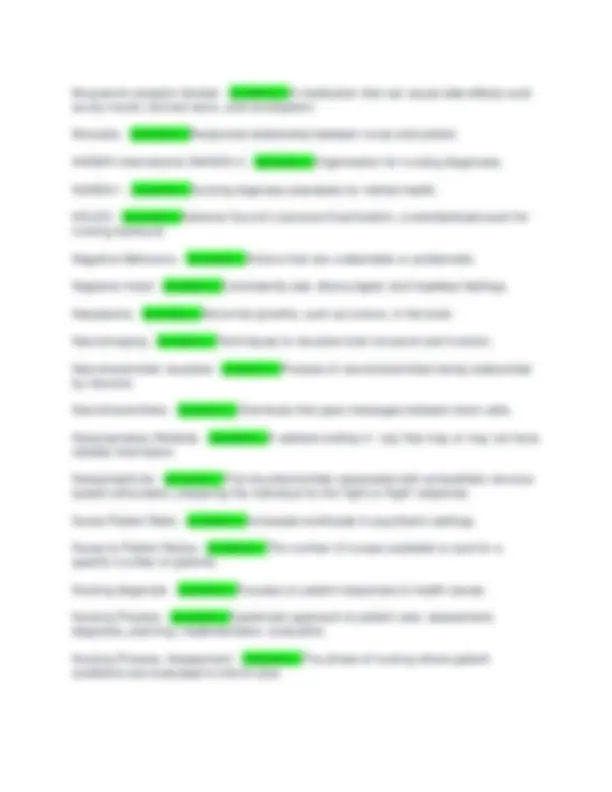
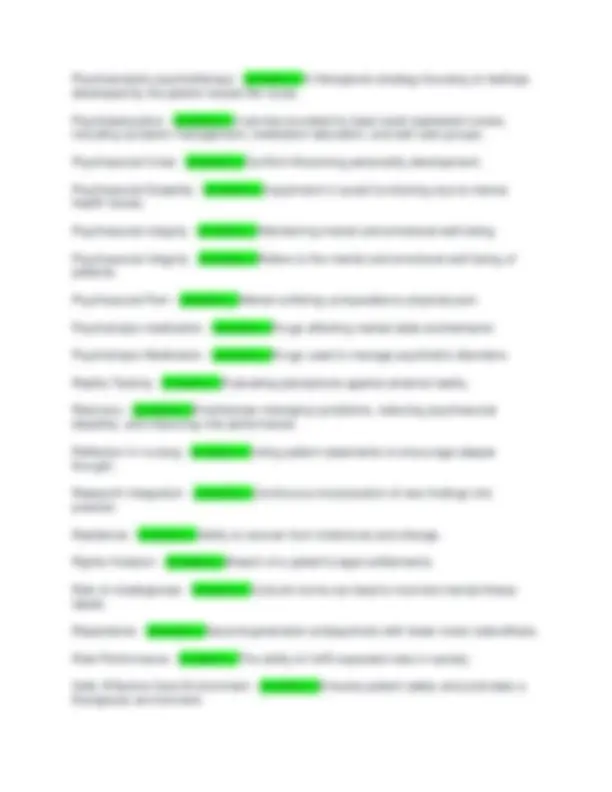
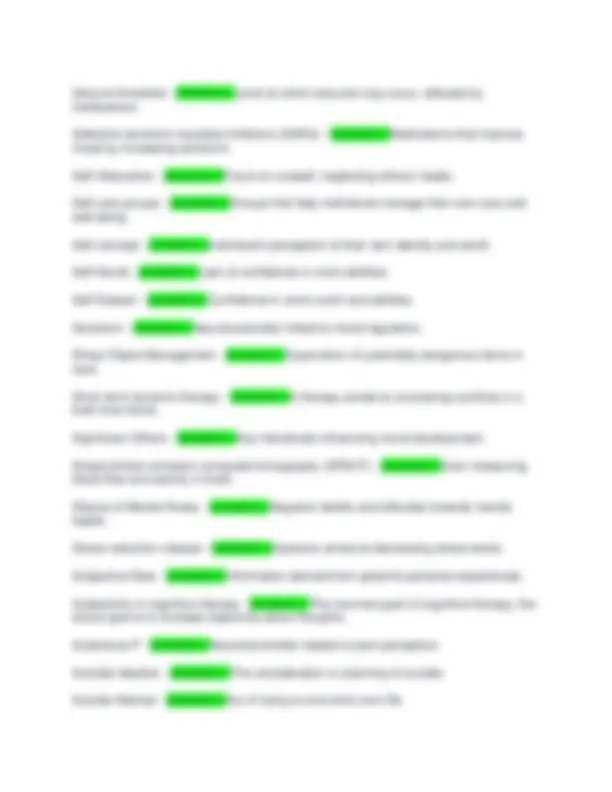
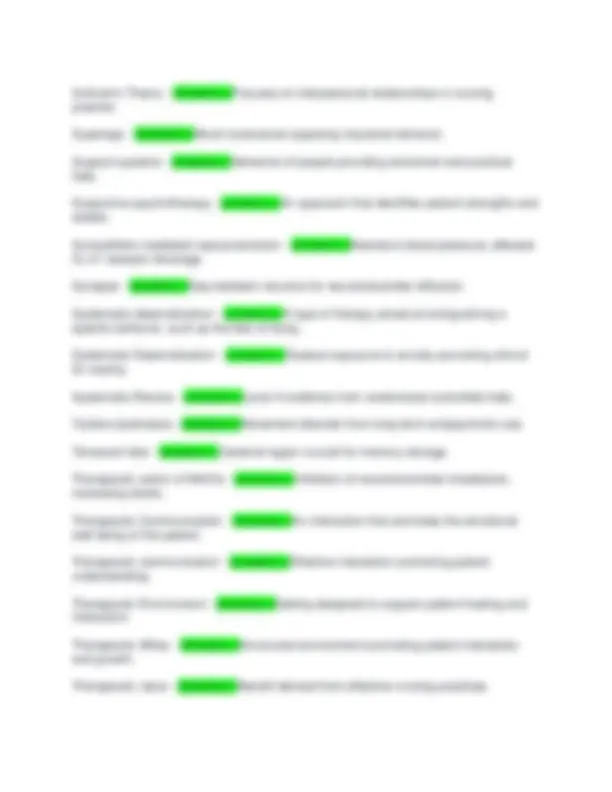


Study with the several resources on Docsity

Earn points by helping other students or get them with a premium plan


Prepare for your exams
Study with the several resources on Docsity

Earn points to download
Earn points by helping other students or get them with a premium plan
Community
Ask the community for help and clear up your study doubts
Discover the best universities in your country according to Docsity users
Free resources
Download our free guides on studying techniques, anxiety management strategies, and thesis advice from Docsity tutors
A comprehensive glossary of essential terms and concepts in psychiatric nursing. it's a valuable resource for students and professionals seeking to expand their knowledge of psychiatric nursing principles and practices. The definitions are concise and easy to understand, making it an excellent tool for quick reference and review.
Typology: Exams
1 / 16

This page cannot be seen from the preview
Don't miss anything!










Acetylcholine - answers>>Neurotransmitter important for learning and memory. Active therapist - answers>>A characteristic of cognitive therapists who engage patients in reality testing their thinking. Adaptive behavior - answers>>Healthy responses to stress and challenges. Advocacy - answers>>Accepting patients' needs for self-expression and seeking to teach skills that will contribute to their well-being. Affective Disorders - answers>>Includes depression, bipolar, and dysthymic disorders. Agranulocytosis - answers>>A rare but serious decrease in granulated white blood cells (WBCs) that can occur with clozapine therapy. Akathisia - answers>>A disturbance of movement caused by dopamine-blocking medications. Anal Stage - answers>>Second stage, related to control and orderliness. Anticholinergic properties - answers>>Inhibition of acetylcholine effects in the body. Anticholinergic side effects - answers>>Side effects likely to occur with medications like fluphenazine, resulting in dry mouth, blurred vision, constipation, and urinary retention. Anticonvulsants - answers>>Medications used to treat bipolar disorder or seizures. Antipsychotic medication - answers>>Used to treat psychosis, including medications like clozapine. Anxiety Disorders - answers>>Mental health conditions causing excessive fear or worry. Anxiety Management - answers>>Techniques to reduce anxiety and improve coping. Anxiolytic drug - answers>>A type of medication used to relieve anxiety, such as chlordiazepoxide. Appraisal of Reality - answers>>Perception of one's environment and circumstances. Appraisal of reality - answers>>Understanding and interpreting one's environment accurately.
Assessment in nursing - answers>>Evaluating patient condition and needs. Attending - answers>>A technique that demonstrates the nurse's commitment to the relationship and reduces feelings of isolation. Auditory Hallucinations - answers>>Hearing voices not present in reality. Autonomy versus Shame and Doubt - answers>>Crisis related to self-control and independence. Axon terminal - answers>>End of neuron where neurotransmitters are released. Basal Ganglia - answers>>Nerve structures influencing movement, thoughts, emotions. Behavior modification - answers>>A therapeutic approach focusing on changing a behavior rather than understanding life situations. Behavior Modification - answers>>Changing behaviors through reinforcement and consequences. Behavioral Crises - answers>>Situations requiring immediate intervention for safety. Behavioral health clinic - answers>>Facility focusing on mental health treatment. Behavioral Theory - answers>>Emphasizes observable behaviors over internal processes. Benzodiazepines - answers>>Medications that provide anxiety relief but are losing favor due to tolerance, high levels of abuse, and connections to dementia. Biological Illness - answers>>Disorders with physiological origins, not solely psychological. Biological origin of schizophrenia - answers>>Research indicates strong biological influences. Biological therapy - answers>>An intervention focusing on medication compliance rather than psychological aspects. Caring Behavior - answers>>Empathetic actions that foster patient connection. Caring Response - answers>>Compassionate communication addressing patient concerns. Case Manager - answers>>Professional coordinating patient care and resources.
Commercial Website - answers>>A website ending in '.com' that may have biased information due to financial influences. Communication skills - answers>>Essential for effective interaction in nursing. Community screenings - answers>>Assessments conducted to identify mental health needs. Complex Communication Skills - answers>>Skills used by psychiatric nurses to address multidimensional problems. Computed tomography (CT) scan - answers>>Imaging technique for structural brain changes. Continuous Observation - answers>>Constant monitoring of a patient for safety. Continuum of mental health - answers>>Spectrum from healthy to unhealthy mental states. Control over behavior - answers>>Ability to manage one's actions and decisions. Control Over Behavior - answers>>Ability to regulate one's actions and impulses. Coping strategies - answers>>Methods to manage stress and emotions. Cortical atrophy - answers>>Loss of neurons in the brain's cortex. Crisis intervention - answers>>Immediate support during a mental health crisis. Cultural influence - answers>>Culture affects the expression of mental health symptoms. Cultural patterns - answers>>Behaviors and beliefs shaped by cultural background. Decreased concentration of neurotransmitters in serum - answers>>A condition that is not associated with blocking neurotransmitter reuptake. Delusions - answers>>False beliefs despite evidence to the contrary. Delusions of Grandeur - answers>>False beliefs of exceptional abilities or importance. Delusions of Persecution - answers>>False beliefs of being targeted or harmed. Dependency - answers>>Reliance on others for emotional support.
Descriptive research study - answers>>Provides evidence for practice but must be viewed in relation to other studies before practice changes. Destruction of receptor sites - answers>>A condition that is not associated with blocking neurotransmitter reuptake. Developmental Level Assessment - answers>>Evaluating patient behavior based on age-related norms. Developmental Problems - answers>>Issues affecting a child's growth and milestones. Developmental Task - answers>>Milestones children aim to achieve at certain ages. Diagnostic and Statistical Manual of Mental Disorders (DSM-5) - answers>>Resource for diagnosing mental disorders. Diagnostic Criteria - answers>>Standards for diagnosing mental health disorders. Discharge Planning - answers>>Process preparing patients for safe transition home. Disorganized thinking - answers>>Incoherent thought patterns often seen in schizophrenia. Dopamine - answers>>Neurotransmitter linked to reward and pleasure. Dopamine-blocking effects - answers>>Medications that block dopamine often produce disturbances of movement, such as akathisia. Dry mouth - answers>>A common side effect of muscarinic-receptor blockade. DSM- 5 - answers>>Diagnostic manual for mental health disorders. Dystonia - answers>>A condition likely to occur early in treatment with first-generation antipsychotic medications, often heralded by sensations of muscle stiffness. Ego - answers>>Mediator balancing desires and reality. Ego Ideal - answers>>Positive self-feelings from achieving personal standards. Emergency Department - answers>>Hospital area for urgent medical and psychiatric care. Emotional Self-Control - answers>>Ability to manage emotional responses effectively. Empathic Understanding - answers>>Creating connections to alleviate patient isolation.
GABA - answers>>Neurotransmitter associated with anxiety reduction. Gamma-aminobutyric acid (GABA) - answers>>Neurotransmitter reducing neuronal excitability. Generativity versus Self-Absorption - answers>>Middle adulthood focus on contributing to society. Genital Stage - answers>>Final stage, focused on mature relationships. Government Website - answers>>A website ending in '.gov' maintained by a government entity. Hallucinations - answers>>Sensory experiences without external stimuli. Health maintenance classes - answers>>Education on maintaining mental and physical health. Health Promotion and Maintenance - answers>>Focuses on enhancing health and preventing illness. Healthy Self-Concept - answers>>Positive perception of oneself and abilities. Hierarchy of Evidence - answers>>Grading system for research findings' influence. Histamine - answers>>Neurotransmitter decreased in depression. Holistic Perspective - answers>>Involves treating both physical and mental health. Holistic principles - answers>>Care approach considering the whole person. Homework assignments in therapy - answers>>Tasks given to patients to complete outside of therapy sessions, often discussed in the next session. Hospitalization frequency - answers>>Involvement in repeated mental health facility admissions. Hypertensive crisis - answers>>Severe increase in blood pressure due to dietary violations. Id - answers>>Part of personality seeking immediate gratification. Idealization and devaluation - answers>>Shifting perceptions of others in relationships.
Increased concentration of neurotransmitters in the synaptic gap - answers>>Occurs when the reuptake of a substance is inhibited, leading to accumulation and ease of transmission of impulses. Individualized guidance - answers>>Tailored advice based on patient's unique situation. Initiative versus Guilt - answers>>Crisis involving initiative and feelings of guilt. Inpatient Hospitalization - answers>>Reserved for patients posing danger to self or others. Intense relationships - answers>>Characterized by idealization and devaluation of others. Interpersonal Climate - answers>>Emotional atmosphere affecting patient interactions. Interpersonal Skills - answers>>Abilities to interact effectively with others. Interpersonal therapy - answers>>A type of therapy that helps the patient come to terms with loss and guilt, returning them to their former level of functioning. Intuition in nursing - answers>>Using instinct rather than systematic approaches. Intuitive Sense - answers>>Guiding care based on understanding patient needs. Journal of Psychiatry - answers>>Publication for research on mental health disorders. Laissez-faire attitude - answers>>Non-interfering approach to patient care. Latency Stage - answers>>Period of social skill development and learning. Least Restrictive Intervention - answers>>Minimally invasive approach to patient management. Letter-Writing Campaign - answers>>Nurses advocating against funding cuts for mental health. Limbic system stimulation - answers>>A condition that is not associated with blocking neurotransmitter reuptake. Major Depressive Disorder - answers>>A mental health condition characterized by persistent feelings of sadness and loss of interest. Manipulation - answers>>Influencing others for personal gain.
Muscarinic-receptor blocker - answers>>A medication that can cause side effects such as dry mouth, blurred vision, and constipation. Mutuality - answers>>Reciprocal relationship between nurse and patient. NANDA International (NANDA-I) - answers>>Organization for nursing diagnoses. NANDA-I - answers>>Nursing diagnosis standards for mental health. NCLEX - answers>>National Council Licensure Examination, a standardized exam for nursing licensure. Negative Behaviors - answers>>Actions that are undesirable or problematic. Negative mood - answers>>Consistently sad, discouraged, and hopeless feelings. Neoplasms - answers>>Abnormal growths, such as tumors, in the brain. Neuroimaging - answers>>Techniques to visualize brain structure and function. Neurotransmitter reuptake - answers>>Process of neurotransmitters being reabsorbed by neurons. Neurotransmitters - answers>>Chemicals that pass messages between brain cells. Nonproprietary Website - answers>>A website ending in '.org' that may or may not have reliable information. Norepinephrine - answers>>The neurotransmitter associated with sympathetic nervous system stimulation, preparing the individual for the 'fight-or-flight' response. Nurse-Patient Ratio - answers>>Increased workloads in psychiatric settings. Nurse-to-Patient Ratios - answers>>The number of nurses available to care for a specific number of patients. Nursing diagnosis - answers>>Focuses on patient responses to health issues. Nursing Process - answers>>Systematic approach to patient care: assessment, diagnosis, planning, implementation, evaluation. Nursing Process: Assessment - answers>>The phase of nursing where patient conditions are evaluated to inform care.
Nursing Process: Evaluation - answers>>The phase where the effectiveness of nursing care is assessed. Nursing Process: Implementation - answers>>The phase where nursing interventions are carried out. Nursing Process: Outcomes Identification - answers>>The phase where expected outcomes of care are established. Nursing Process: Planning - answers>>Organizing care based on patient needs. Occipital Lobe - answers>>Brain region primarily responsible for vision. Operant Conditioning - answers>>Behavior modification through reinforcement of desired actions. Oral Stage - answers>>First psychosexual stage, focused on dependency. Orthostatic hypotension - answers>>A side effect associated with α1-receptor antagonism. Overall happiness - answers>>Subjective assessment of life satisfaction. Parietal lobe - answers>>Involved in processing and storing memories. Patient advocacy - answers>>Supporting patient's rights and needs in care. Patient Decompensation - answers>>Worsening of a patient's mental health condition. Patient Discharge - answers>>Condition for leaving based on treatment compliance. Patient Education - answers>>Informing patients about their health and treatment. Patient empowerment - answers>>Encouraging patients to take charge of their health. Patient Individuality - answers>>Recognizing unique needs of each patient. Patient Interaction - answers>>Engagement between nurse and patient for effective care. Patient Perception - answers>>How patients view their nurse's caring nature. Patient Rights - answers>>Entitlements ensuring dignity and care in treatment. Patient-centered care - answers>>Care tailored to individual patient needs.
Psychoanalytic psychotherapy - answers>>A therapeutic strategy focusing on feelings developed by the patient toward the nurse. Psychoeducation - answers>>A service provided by basic level registered nurses, including symptom management, medication education, and self-care groups. Psychosocial Crisis - answers>>Conflict influencing personality development. Psychosocial Disability - answers>>Impairment in social functioning due to mental health issues. Psychosocial integrity - answers>>Maintaining mental and emotional well-being. Psychosocial Integrity - answers>>Refers to the mental and emotional well-being of patients. Psychosocial Pain - answers>>Mental suffering comparable to physical pain. Psychotropic medication - answers>>Drugs affecting mental state and behavior. Psychotropic Medication - answers>>Drugs used to manage psychiatric disorders. Reality Testing - answers>>Evaluating perceptions against external reality. Recovery - answers>>Emphasizes managing symptoms, reducing psychosocial disability, and improving role performance. Reflection in nursing - answers>>Using patient statements to encourage deeper thought. Research Integration - answers>>Continuous incorporation of new findings into practice. Resilience - answers>>Ability to recover from misfortune and change. Rights Violation - answers>>Breach of a patient's legal entitlements. Risk of misdiagnosis - answers>>Cultural norms can lead to incorrect mental illness labels. Risperidone - answers>>Second-generation antipsychotic with fewer motor side effects. Role Performance - answers>>The ability to fulfill expected roles in society. Safe, Effective Care Environment - answers>>Ensures patient safety and promotes a therapeutic environment.
Seizure threshold - answers>>Level at which seizures may occur, affected by medications. Selective serotonin reuptake inhibitors (SSRIs) - answers>>Medications that improve mood by increasing serotonin. Self-Absorption - answers>>Focus on oneself, neglecting others' needs. Self-care groups - answers>>Groups that help individuals manage their own care and well-being. Self-concept - answers>>Individual's perception of their own identity and worth. Self-Doubt - answers>>Lack of confidence in one's abilities. Self-Esteem - answers>>Confidence in one's worth and abilities. Serotonin - answers>>Neurotransmitter linked to mood regulation. Sharp Object Management - answers>>Supervision of potentially dangerous items in care. Short-term dynamic therapy - answers>>A therapy aimed at uncovering conflicts in a brief time frame. Significant Others - answers>>Key individuals influencing moral development. Single-photon emission computed tomography (SPECT) - answers>>Scan measuring blood flow and activity in brain. Stigma of Mental Illness - answers>>Negative beliefs and attitudes towards mental health. Stress reduction classes - answers>>Sessions aimed at decreasing stress levels. Subjective Data - answers>>Information derived from patient's personal experiences. Subjectivity in cognitive therapy - answers>>The incorrect goal of cognitive therapy; the actual goal is to increase objectivity about thoughts. Substance P - answers>>Neurotransmitter related to pain perception. Suicidal Ideation - answers>>The consideration or planning of suicide. Suicide Attempt - answers>>Act of trying to end one's own life.
Toilet Training - answers>>Process of teaching children to use the toilet. Transactional analysis - answers>>An approach that discusses ego states. Transference - answers>>Patient projects feelings onto therapist during therapy. Treatment Plan - answers>>Document outlining patient care strategies and goals. Trial and error - answers>>Learning through experimentation and mistakes. Tricyclic antidepressants - answers>>Medications used to treat symptoms of depression. Trust versus Mistrust - answers>>Infancy stage focused on developing trust. Tyramine-free diet - answers>>Diet required for patients on phenelzine. Unpopular beliefs - answers>>Expressing unconventional ideas may suggest instability. Ventricular enlargement - answers>>Increase in size of brain's ventricles. Weight gain - answers>>Possible side effect of antipsychotic medications.